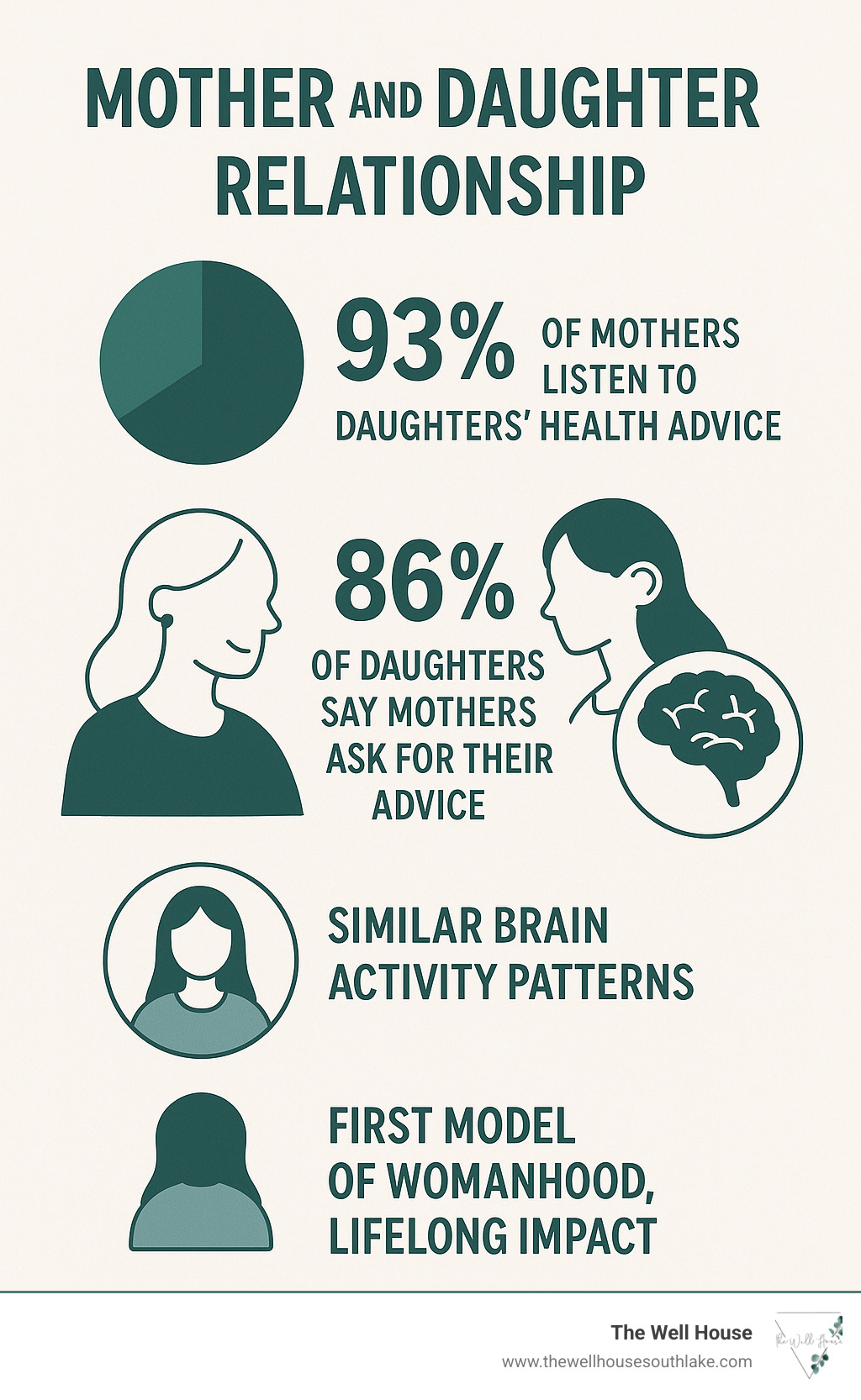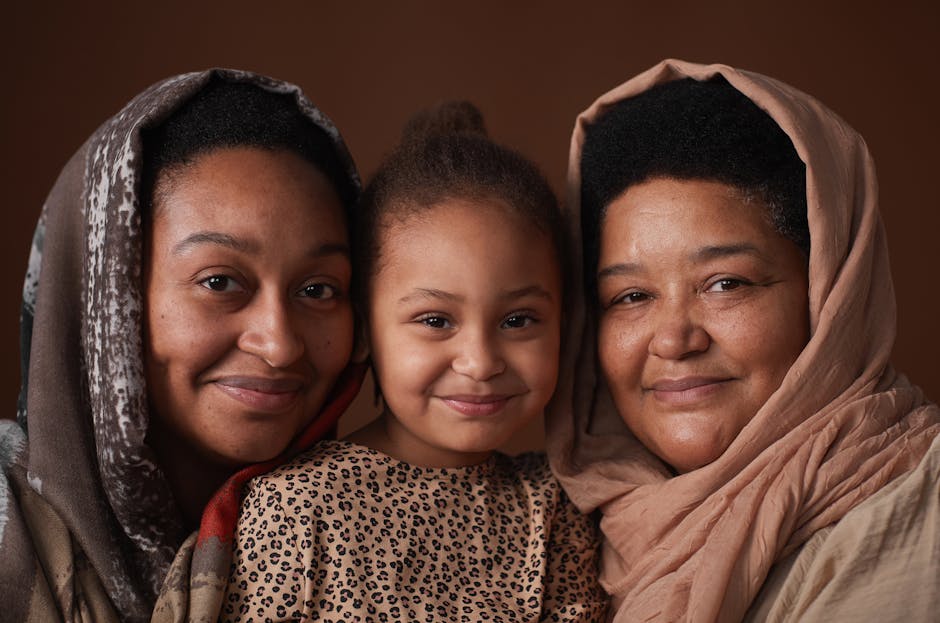Strengthening the Ties: A Guide to Mother-Daughter Harmony
The Foundation of Your Emotional World
The mother and daughter relationship is the cornerstone of a woman’s emotional development. It’s her first glimpse into what it means to be female, shaping her identity as a woman, friend, and future parent.
Key aspects of the mother-daughter relationship:
- Emotional intimacy: Mothers and daughters often share similar brain activity patterns.
- Role modeling: Mothers are the first example of womanhood for their daughters.
- Lifelong influence: The bond impacts self-esteem, future relationships, and parenting style.
- Mutual support: 86% of daughters report their mothers ask them for advice.
- Complex dynamics: The relationship evolves through dependency, friendship, and caregiving.
- Generational impact: A mother’s self-love directly influences her daughter’s confidence.
Understanding this bond’s profound impact is the first step toward healing and growth, whether your relationship brings you joy or struggle.
The relationship’s power lies in its intensity. Research shows mothers and daughters have similar emotional responses and brain patterns. This neural synchrony creates deep understanding but can also amplify conflict. While most mothers report getting along well with their daughters, many relationships carry underlying tension around autonomy and expectations.
I’m Jennifer Kruse, a Licensed Professional Counselor Supervisor specializing in mother and daughter relationship dynamics with a holistic soul-mind-body approach. I help mothers and daughters steer this complex bond to find healing, understanding, and authentic connection.

Easy mother and daughter relationship glossary:
The Unbreakable Bond: Why This Connection is So Powerful
The mother and daughter relationship is one of life’s most powerful connections, shaping how we see ourselves and love others. It begins with the first voice a daughter hears and the first arms that hold her.
This bond is special due to “neural synchrony.” Research shows mothers and daughters have similar brain activity patterns, creating a unique, almost telepathic, understanding. A mother is her daughter’s first teacher, confidante, and primary role model for womanhood, teaching crucial lessons on self-worth and navigating the world.
The mother and daughter relationship evolves beautifully over time, often blossoming from dependency into a deep friendship where mothers and daughters become each other’s closest confidantes.
The influence is mutual: 86% of daughters report their mothers ask for their advice, while 93% of mothers listen to health advice from their daughters. This two-way street is powerful for personal and family growth. Research explores its potential for health promotion.
At The Well House, we see how nurturing family dynamics can transform lives. Our holistic approach recognizes that healing foundational relationships opens up healing in all areas of life. You can learn more about our approach to family dynamics and how we support families.
Signs of a Healthy Mother-Daughter Relationship
A healthy mother and daughter relationship is one where both individuals can disagree without attacking, celebrate without jealousy, and offer support without control. It’s a bond that feels secure and loving.

Key signs of a thriving mother-daughter bond include:
- Mutual respect: Valuing each other’s opinions and choices, even when different.
- Open communication: Feeling safe to share thoughts and feelings without judgment.
- Acceptance of differences: Celebrating what makes each other unique.
- Healthy boundaries: Protecting individual autonomy while staying connected.
- Shared joy and mutual support: Celebrating successes and navigating challenges together.
- Forgiveness and trust: Releasing mistakes and believing in each other’s good intentions.
When these elements are present, both mother and daughter be their authentic selves.
How a Mother’s Self-Love Shapes Her Daughter
One of the greatest gifts a mother can give her daughter is her own self-love. When a mother values herself, she provides a powerful blueprint for her daughter’s self-respect. It’s not about perfection, but about treating oneself with kindness and worth.
Daughters absorb lessons on self-worth by observing their mothers. A mother who practices self-care, speaks kindly about herself, and sets healthy boundaries teaches her daughter these behaviors are essential.
Conversely, when mothers struggle with self-acceptance, daughters often internalize those same struggles, feeling they must earn love or seek external validation.
Maternal self-acceptance breaks generational cycles. When mothers model confidence, they give their daughters permission to do the same. They show them that self-nurturing isn’t selfish—it’s essential. This modeling strengthens the mother and daughter relationship, creating a legacy of confidence for generations to come.
Navigating the Labyrinth: Common Challenges in the Mother and Daughter Relationship
The mother and daughter relationship can feel like an emotional rollercoaster, which is normal. The deep connection that makes it special also makes it complicated, as every interaction carries weight.
The struggle for independence is a primary challenge. It starts in toddlerhood and continues into adulthood, creating autonomy conflicts as daughters seek to spread their wings while mothers want to protect them.
Unspoken expectations and generational differences add layers of complexity. The world a daughter grows up in is vastly different from her mother’s, leading to misunderstandings about careers, lifestyles, and values. The relationship also undergoes major transitions as a dependent child becomes an independent adult and, eventually, a caregiver.
Unresolved conflicts can cast long shadows, rippling out into every other connection in your lives. Recognizing these challenges is the first step toward working through them. If you’re feeling overwhelmed, we have resources to help. You can find more info about coping with motherhood on our website.
Understanding Unhealthy Interaction Patterns
Unhealthy interaction patterns can develop in the mother and daughter relationship, often unintentionally. These dynamics can take root when a mother’s own wounds are unhealed or she’s overwhelmed by stress.

- Dismissive patterns: The mother consistently brushes off her daughter’s feelings (“You’re too sensitive”), teaching the daughter that her emotions don’t matter.
- Controlling behaviors: Often stemming from fear, a mother micromanages her daughter’s life, leaving the daughter feeling suffocated and unable to trust her own judgment.
- Emotional unavailability: The mother is physically present but emotionally distant, leaving the daughter feeling invisible and constantly seeking love.
- Combative dynamics: Every conversation becomes a battle, with the mother being highly critical. The daughter learns to either fight back or shut down.
- Self-involved mothers: The mother struggles to see her daughter as a separate person, making her daughter’s life all about her own needs and feelings.
- Role reversal: The daughter becomes her mother’s emotional caretaker at a young age, missing out on being cared for herself.
These patterns, often stemming from a mother’s own difficult childhood, can profoundly impact a daughter’s self-esteem and ability to form healthy relationships. For more on this, Psychology Today offers insights on 8 Toxic Patterns in Mother-Daughter Relationships.
The Generation Gap and the Fight for Autonomy
The generation gap can feel vast, as mothers and daughters grow up in different worlds with different norms. Clashes over career expectations, lifestyle choices, and parenting styles are common. These different worldviews can make conversations feel impossible, with both sides feeling judged.
A daughter’s need for emotional separation is a natural part of her development, though it can feel like rejection to a mother. Establishing a separate identity is crucial work for every daughter. She must figure out who she is apart from her mother, which may involve making choices you wouldn’t. Learning to step back and trust her process is one of the hardest parts of motherhood.
The goal isn’t to eliminate the generation gap but to bridge it with understanding and respect.
When Roles Reverse: Daughters as Caregivers
A profound transition occurs when daughters begin caring for aging mothers, reversing the roles of a lifetime. This shift brings up complicated emotions, including grief for the mother you remember, guilt about feeling overwhelmed, and sadness over her decline.
Old relationship patterns often resurface under the stress of caregiving. The practical and financial strain can be immense, and setting boundaries becomes crucial but difficult. Learning to ask for help from family or professionals is necessary for your own well-being.
Finding support from others in similar situations can provide practical advice and emotional validation. It’s also important to acknowledge anticipatory grief—mourning the losses that occur while your mother is still alive. This phase of the mother and daughter relationship requires enormous compassion for both your mother and yourself, and it can sometimes bring unexpected gifts of healing and appreciation.
Building Bridges: Actionable Strategies for a Stronger Bond
Even when the mother and daughter relationship is strained, there is always hope for healing. Rebuilding connection takes courage and patience, but it’s possible.

The foundation of rebuilding starts with active listening—truly hearing each other without planning a response. Reflecting back what you hear (“It sounds like you felt…”) provides powerful validation. Mutual respect is the bedrock; even when you disagree, you can honor each other’s perspectives. Rebuilding trust happens one small, consistent action at a time.
Focus on the positive by actively looking for moments of joy and connection. Create new positive memories with shared activities, like taking a walk or cooking a meal together. Sometimes, an outside perspective is needed to break old patterns. Our Parent Coaching Expert Guidance can provide fresh eyes and proven strategies.
The Art of Communication and Setting Healthy Boundaries
Effective communication and healthy boundaries are about treating each other with respect and kindness. These skills can transform a relationship from a battleground into a safe haven.
- Use “I” statements. Instead of saying, “You never listen,” try, “I feel unheard.” This removes blame and opens the door for conversation by focusing on your own feelings.
- Practice non-judgmental listening. Sometimes the most loving act is to simply witness someone’s experience without trying to fix it.
- Avoid criticism. Express your needs positively: “I’d love to spend more time together” is more effective than “You never call me.”
- Define personal space and respect privacy. Family ties don’t entitle you to know everything. Daughters need space to grow, and mothers need respect for their autonomy.
Boundaries actually create more intimacy, not less. When you feel safe and respected, you can be more open and vulnerable. Our parenting advice for teens resources can help steer these conversations.
Healing a Strained Mother and Daughter Relationship Through Empathy
When the mother and daughter relationship is damaged, empathy is the bridge to healing. It means looking past the hurt to understand the person.
Understanding your mother’s history can be revolutionary. She was once a daughter, too, and grew up with different pressures. Asking gentle questions about her past can open doors to compassion. Practicing compassion doesn’t excuse harmful behavior, but it acknowledges that everyone is doing their best with the tools they have.
Acknowledging past hurts requires courage but is often the start of real healing. This means letting go of perfection and releasing the fantasy of a perfect relationship. Moving from blame to understanding transforms conversations. Instead of “You always…” try “Help me understand…” This shift invites connection instead of defensiveness. Healing happens slowly, in small moments of grace.
When to Seek Support: Recognizing the Need for Professional Help
Sometimes, despite our best efforts, the mother and daughter relationship requires professional guidance. Recognizing this need is a sign of wisdom and courage, not failure.
It may be time to consider outside help when you experience:
- Persistent conflict: Every conversation turns into the same argument, leaving you both exhausted and unheard.
- Deep-seated resentment: Old wounds continue to fester, poisoning current interactions.
- Communication breakdown: Attempts to talk result in yelling, silence, or further misunderstanding.
- Impact on mental health: The relationship causes significant anxiety, depression, or distress that affects other areas of your life.
- Feeling stuck: You’re trapped in negative patterns despite genuine efforts to change.
A skilled therapist provides an unbiased perspective, mediates difficult conversations, and equips you with practical coping skills. Therapy can uncover root issues, help process past hurts, and guide the relationship toward healthier patterns.
At The Well House, we understand these complexities. Our Mother and Daughter Therapy services are designed to help families heal, grow, and refind the joy in their connection.
How Therapy Can Help
Therapy can transform even the most strained relationships by creating a safe space for healing. Our holistic approach supports both mothers and daughters as they work toward a stronger bond.
- Mediated communication: A therapist acts as a neutral facilitator, guiding conversations so both people feel heard and respected, especially when emotions are high.
- Uncovering root issues: We help you explore the underlying causes of current conflicts, from childhood experiences to unmet emotional needs.
- Learning new coping skills: We teach effective ways to manage emotions, set boundaries, and resolve conflicts constructively—skills that benefit all relationships.
- Healing old wounds: Therapy provides a safe container to process past hurts, allowing for genuine forgiveness and release of resentment.
- Forging a new path forward: With guidance, you can redefine your relationship, moving from painful patterns to a dynamic based on mutual respect and understanding.
- Emotional separation with professional guidance: We support daughters in developing a healthy sense of self and help mothers steer letting go with grace.
Our therapists at The Well House specialize in mind, body, and spirit wellness. We offer individualized mental health services throughout the Southlake area and via telehealth, ensuring you can access the compassionate support you need.
Conclusion: Fostering a Relationship of Love and Respect
The mother and daughter relationship is an extraordinary, lifelong journey. We’ve explored its profound power and complexities, affirming that even the most strained relationships hold the potential for healing and growth.
The deep intimacy that makes this bond special can also be challenging. However, every relationship has the capacity for change. The journey from conflict to connection is always possible when we practice open communication, set healthy boundaries, and approach each other with empathy.
Your relationship doesn’t have to be perfect to be meaningful. It’s often through navigating challenges together that we find the true depth of our connection. The choice to keep showing up and loving despite difficulties is what creates lasting bonds.
At The Well House, we’ve witnessed the beautiful changes that happen when mothers and daughters commit to understanding each other. Our holistic approach honors the mind, body, and spirit, recognizing that this relationship touches every part of who we are.

The ripple effects of a healthy mother and daughter relationship extend for generations. When you choose connection over distance, you create a legacy of emotional wellness.
Seeking support is a sign of courage. If you’re ready to foster a relationship built on mutual respect and genuine love, we’re here to walk alongside you. You can Get compassionate support with therapy for moms in Southlake, Texas and begin this important work today. Your relationship is worth it.
Insurance & Payment Options at The Well House Southlake
At The Well House Southlake, we believe that quality mental health care should be both accessible and affordable. Whether you’re seeking therapy, couples counseling, or online sessions, our goal is to make it easy for you to access therapy that takes insurance and supports your unique needs.
We currently accept:
- Blue Cross Blue Shield (BCBS)
- Aetna
- United Health care (UHC)
- Self-Pay and Out-of-Network Options
If you’re exploring counseling that takes insurance or need help verifying your coverage, our team will guide you through each step — from confirming your benefits to booking your first session. We’re committed to making your experience simple and stress-free, so you can focus on what matters most: your well-being.











